Legalize Sports Cheating
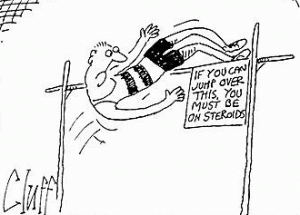 John Tierney and Megan McArdle argue that we should let athletes use whatever performance enhancing drugs they want since some will cheat regardless of the rules and because our definition of “fair” competition evolves over time.
John Tierney and Megan McArdle argue that we should let athletes use whatever performance enhancing drugs they want since some will cheat regardless of the rules and because our definition of “fair” competition evolves over time.
The response to that, though, is obvious: many of these drugs are dangerous and legitimating them all but mandates them. John, an early commenter on Megan’s post, puts it nicely:
The problem with doping is that it filters down to the lowest levels of competition. If you told me that I could take a drug that would allow me to win a gold medal but it would take a couple of years off of my life, I might do it and even if I didn’t I wouldn’t blame someone who did. But once you allow doping, the choice is made for everyone. It means that you have to dope to compete at the Olympics. But of course you are not born an Olympic athlete. You start at lower levels. If you allow doping for swimming in the Olympics, that means that all of the college athletes and post college athletes who compete for the spots on the team will also be doping. If there are some athletes in college who dope, that means all the athletes in college will dope if they expect to compete with the ones who do and so forth until finally one day you have people doping to play high school sports.
Tierney’s other point is harder to dismiss: Because the cheaters are always ahead of the testing, all competition takes place under a cloud of suspicion.
The journal Nature, in an editorial in the current issue, complains that “antidoping authorities have fostered a sporting culture of suspicion, secrecy and fear” by relying on unscientifically calibrated tests, like the unreliable test for synthetic testosterone that cost Floyd Landis his 2006 Tour de France victory. Even if the authorities manage to correct their tests, they can’t possibly keep up with the accelerating advances in biology. Some athletes are already considering new drugs like Aicar and GW1516, which made news recently when researchers at the Salk Institute used them to quickly turn couch-potato mice into treadmill champions with new, strong muscles.
Of course, abandoning testing will lead to more, not less, suspicion that people are doping. Perhaps, though, people wouldn’t care if the rules were changed so that it would no longer be “cheating” to take these drugs. But, again, that essentially forces 14-year-olds with Olympic dreams to become lab rats.
Image: Cartoon Stock

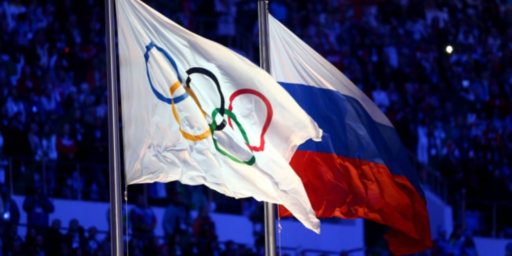
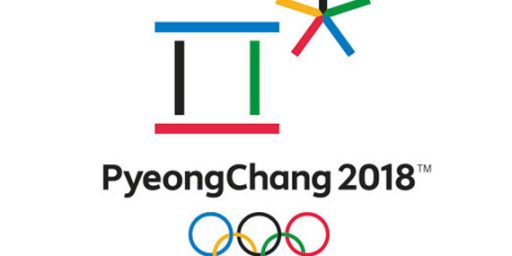

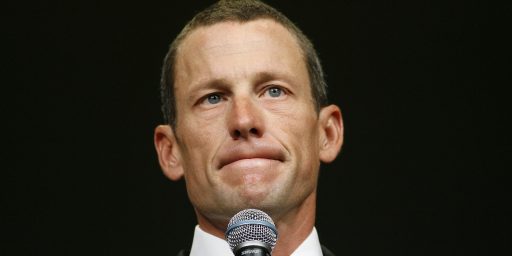
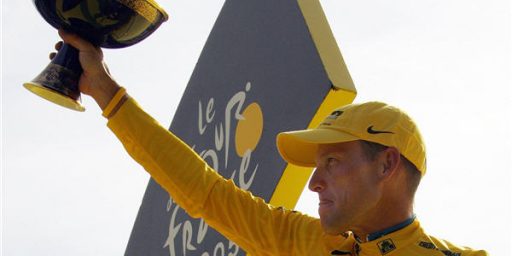
But even under this less-than-ideal situation, you’re not preventing people who choose not to dope from competing. In a system where everybody is doping, nobody is going to give an athletic scholarship to someone who refuses, regardless of how talented they are.
I would rather play a game where people break the rules, than a game where the rules are broken. At least that way, if I win, I can be proud of it.
I think what’s necessary is a two-tiered sports system: doped and natural. Let those who wish to push the limits of the human body, with drugs, prosthetics, augmentations, whatever, compete against each other.
Let others, using only as well trained as possible human bodies compete against each other.
In case the latter sounds too boring–fewer records being broken, no mind-boggling performances, etc.–the second group can compete in the nude. That ought to lock in viewer markets.
I think the logic should be applied to the speed limits. We know people are going to exceed the speed limit, so why bother having one. Let drivers compete to the best of their (and their car’s) abilities. We know that there is always and arms race for radar detectors and the such, so why even bother having radar detectors. It seems only fair.
I would rather compete under the cloud of suspicion – and test everyone – rather than have athletes take the risks to their body. Eventually, drugs that take two years off your life will become 5 years and then 10 years, especially when young athletes begin taking the drugs earlier and earlier.
I would rather have the rules, and test and risk that some athletes are getting through than to have athletes everywhere and all stages doing this stuff to get ahead.
Olympic competition aside, I also wonder what it would do to college sports and whether students who wanted to remain clean could compete at the highest levels if it was permitted everywhere.
Competition for national championships is fierce in division I and I can’t help but think it would trickle down to this level where most of the athletes will not be competing once they complete college, but who may have compromised their health.
Apparently, “serious” blogging has reached the point of talk radio where controversial positions seemingly coming out of nowhere must be taken almost every day to generate interest and eyeballs.
I wonder how Mr. Tierney and Ms. McArdle feel about legalizing plagiarism, slander, and copyright infringement?
“The response to that, though, is obvious: many of these drugs are dangerous and legitimating them all but mandates them.”
I don’t buy that. It wasn’t that long ago that the NHL had, basically, a nonexistent performance enhancing drug testing program, i.e. essentially easy to dope with no fallout. All hockey players of that time did not dope. Even currently, compared to other sports, their testing program is weak at best. Still, all players do not dope.
Obviously some athletes get more advantage out of doping that others. I don’t expect fencing to have a high rate of doping either.
“Obviously some athletes get more advantage out of doping that others. I don’t expect fencing to have a high rate of doping either.”
I don’t expect fencing to go on a doping bender either but hockey is a ripe sport for it. You need to be pretty stout and you NEED to heal quickly. They play a lot of physically demanding games over a season with little time between games and where injury is common. If nothing else, doping would really help healing those wounds but it doesn’t appear that doping is prevalent in the NHL.
I don’t think most doping drugs give a real advantage in healing time.
“I don’t think most doping drugs give a real advantage in healing time.”
I took doping to mean steroids type enhancing drugs from “many of these drugs are dangerous”. They do in fact enhance rapid healing thus their benefit but that was probably a bad assumption on my part.
The real reason doping won’t be legalized is that it would kill professional sports (particularly football and baseball) and the powers that be aren’t going to let that happen. Any time there are large sums of money involved and the reason given for a particular action is “It will harm the children”, the BS detector should go off very loudly.
I’ve long argued doping should be permitted, but with caveat – once a doper, always a doper and doper classes in all competetions. Any record will be accompanied with the clause, “record achieved while doping.”
After watching the “ladies” gymnastics last evening, I would add cheaters to the doping category. If that is what a competitor, or nation, feels compelled to do to step upon the highest platform the hopelessly corruptible IOC sets forth, fine. Let’s just not delude ourselves as to how the Ben Johnsons of the world win.
Then you are uninformed.
Test in the junior ranks so kids won’t feel as pressured to do it. Allow adult athletes “some” amounts of the hormones that promote healing and try to test for the obvious performance enhancers.
I get the libertarian position here, why not let those who want to do it, do it, so long as no one else is harmed. I don’t have a problem with this if there is a demand for “doping” leagues.
I’m not convinced people will prefer doped sports leagues to “natural” ones, and those leagues can follow the testing guidelines I mention above.
The kids are safe, the rules for natural and doping are stipulated, let’s see which people want to do. I suspect doping leagues will not have much appeal.
Several comments have suggested that there be a type of “two-tier” league system, where one league is “natural” and the other a doping league. The primary problem I see with this is that those in the natural league, as it stands now, use those illegal drugs for illegal gain. I don’t see how the biggest concern of the original post — that the sports operate under a cloud of suspicion — would change if we had two leagues. The natural and probable consequence is that there will still be many of those in the natural league who are doping in order to gain the unfair advantage — the exact same reason that it is done now.
I have always thought it would be a good idea (but I don’t know how possible it is) to take a significant amount of blood from every player on a team that wins a championship and every player that breaks a record. Then, over time, as better testing evolves, that blood is periodically tested for what-was-once those “new” drugs. At any given moment, a baseball player might come by and utterly destroy the home run record, but ten years down the road, his drug use might be obviously-testable. At that time, his name would be stricken from the record books or off of the championship record, whatever be the case.